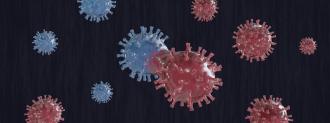Scientists from Drexel University have developed a tool that can quickly identify and label coronavirus mutations.
They believe their tool may be able to help officials track the spread of the novel coronavirus Sars-CoV-2 and identify places where social distancing measures are having a positive effect.
It could also aid in the development of treatments and vaccines for the coronavirus — helping bring the COVID-19 outbreak to an end as quickly as possible.
Identifying Coronavirus Mutations
Just like any virus, the coronavirus’s genetic code occasionally undergoes slight changes, or mutations, as the virus spreads from person to person.
The more we can learn about these coronavirus mutations, the better equipped we’ll be to combat the virus. But identifying mutations amongst all 30,000 base pairs in its genome can be time consuming.
In a paper published on the preprint server bioRxiv on April 16, the Drexel team details a tool they created that could speed up the process.
The virus’s genetic code occasionally undergoes slight changes as it spreads from person to person.
After analyzing 3,832 samples of the coronavirus’s genome, they identified 17 places along the sequence that are “highly informative of variation between the viral genomes sequenced in different individuals,” according to the paper.
Essentially, samples of the coronavirus’s genome that matched in those 17 places would both belong to one “subtype” of the virus in terms of their coronavirus mutations.
The team created a tool that could generate subtype labels for any coronavirus sequence based on those 17 locations and made it available to researchers via GitHub.
“It’s the equivalent of scanning a barcode instead of typing in the full product code number,” lead researcher Gail Rosen said in a news release. “And right now, we’re all trying to get through the grocery store a bit faster.”
Battling COVID-19
According to Rosen, tracking coronavirus mutations can help us understand how the virus is spreading geographically. The subtypes prevalent in New York, for example, match those from Austria and France, but not Italy.
Tracking can also let us know more about the efficacy of containment efforts — if a subtype doesn’t spread out of a certain region, for example, we might know that that population’s social distancing efforts are working.
Continuously tracking coronavirus mutations throughout the COVID-19 outbreak could also inform how we treat it — after all, the flu virus mutates in such a way that researchers have to create a new vaccine to combat it every year.
Based on the Drexel team’s analysis of coronavirus mutations, though, it doesn’t seem like we’ll have to worry about that with a COVID-19 vaccine.
“We’re seeing that the two parts of the virus that seem not to be mutating are the ones responsible for its entry into healthy cells and packaging its RNA,” Rosen said.
“Both of these are important targets for understanding the body’s immune response, identifying antiviral therapeutics, and designing vaccines,” she continued.
If that changes, though, and we start to see the coronavirus mutating in different ways, researchers may need to pivot how they plan to treat or prevent infections — and now that they have a faster way of identifying coronavirus mutations, that won’t be as daunting of a task.






